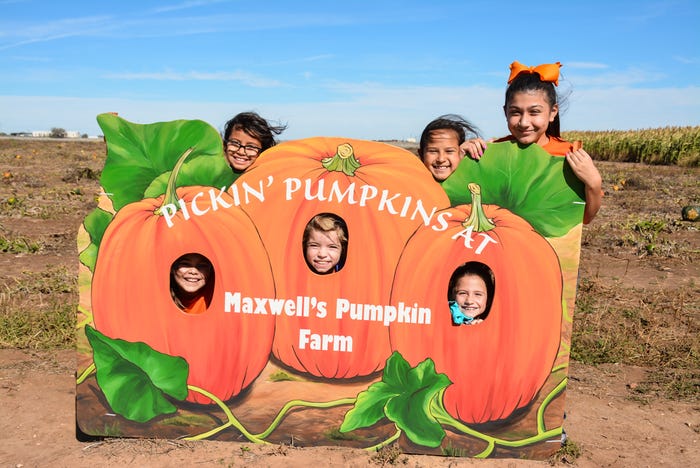
What began on five acres as a “get all you can carry for $5,” pumpkin business has grown into an 80-acre corn maze and pumpkin patch south of Amarillo, Texas, called Maxwell’s Pumpkin Farm.
For seven weeks, Maxwell’s swings open its gate for families and class field trips to solve clues to work through their maze, pick a pumpkin from the vine, take a ride down Maxwell’s Magic Carpet slide on potato sacks and play in a “corn box��” knee-deep in corn kernels — to name a few.
Maxwell’s Pumpkin Farm is owned by Larry Borger, a retired real estate businessman. The ground he uses for his agritourism business he previously farmed, but like many High Plains growers, the lack of a valuable resource made him change directions.
“We used to grow alfalfa there and then in 2009/2010 the water got to be an issue — we didn’t have enough water to keep the alfalfa going,” says Borger who’s in his 11th season. “Now, all we grow is Bermuda grass where the apple cannons are, pumpkins and hay grazer for the mazes.”
The last two years, Maxwell’s has averaged about 40,000 guests. Coupled with meeting people from all over the Texas Panhandle and New Mexico, Borger says his greatest joy is, “watching families spend time together and doing things outside instead of sitting in front of the tv or playing video games,” he says. “We have families that come back every year and some show us pictures from the past of their kids at the maze. That’s always fun to see.”
When it comes to his greatest challenge, it’s not much different than most farmers on the Texas High Plains. “The weather is huge and water is a resource that is becoming more of a challenge. This summer, we had spotty showers, and we didn’t get hardly any help with rain, so we’re trying to irrigate best we can. We don’t have the water to grow as many acres as we’re trying to grow if we don’t get a little help from the rain.”
Maxwell’s opened September 22 and will close the first weekend in November. As for the rest of the year, he says he’ll be planning and planting in preparation for the next.
Nature-based tourism, which includes agritourism, contributes $646 billion annually to the U.S. economy, supporting nearly 6.1 million jobs and generates $1.9 billion in annual state and local tax revenue, according to the Outdoor Industry Association.
To learn more about agritourism go to https://naturetourism.tamu.edu/agritourism/facts-agritourism/ , or about Maxwell’s Pumpkin Farm, log onto http://maxwellspumpkinfarm.com.
About the Author(s)
You May Also Like






